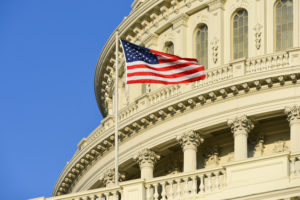The next round of elections is November 2023. Several votes are coming up that some believe will offer a forecast of political fortunes. While a few months away, it is timely to consider opportunities for improvement to election integrity.
This past week, the Subcommittee on Elections for the U.S. Committee on House Administration held an oversight hearing on election observer access and “the important role election observers played in the last election cycle in helping to strengthen voter confidence in election processes and outcomes.”
Before the hearing, I was able to chat with a colleague of one of the hearing witnesses, Lisa Lyons, county clerk of Kent County, Michigan—“a bellwether county” that was “on the front lines of 2020.” In her role, Ms. Lyons manages all county elections.
Much like several Concerned Women for America and Young Women for America leaders who have spoken with Members of Congress, she answered a last-minute call to pack her bags and fly to Washington, D.C. to share her experience!
Rep. Laurel Lee (R-Florida), subcommittee chair, asked about the process for Kent County election observer certification. Ms. Lyons explained that there are election observers for both parties and how she routinely approved applications for election observers from groups across the ideological spectrum. In Kent County, every observer is credentialed according to a manual produced by the state, and groups are able to apply to credential observers. Every county clerk must notify the local clerk of credentialing groups, and the local clerks in turn advise precincts. Observers may not approach or speak to a voter or imply the ability to assist a voter. Any verbal interaction with an observer is established with an election inspector designated to converse with the observers themselves.
Ms. Lyons emphasized how transparency breeds trust. It is clear from the process in Kent County alone the importance of sound rules and consistent communication between election officials.
Rep. Terri Sewell (D-Alabama), subcommittee ranking member, asked how Kent County addresses voter or observer intimidation. Ms. Lyons said this is addressed by proper training for election observers. The county clerk trains election inspectors who administer elections, and approved political parties and organizations train election observers. Knowledge of the laws and rights is a buffer against intimidation.
Overall, the hearing served as a refresher on the appropriate role of election observers in the election process.
If you want to get involved and are interested in being an election observer, take a look at the “Laws Governing Observers By State” on our She Prays She Votes page.
Another way to engage is to be a poll watcher. A poll watcher is a volunteer citizen appointed on behalf of a candidate, political party, or proponents or opponents of a ballot measure to observe the election process and report any problems. Poll watchers may observe:
- Early voting/election day polling place activities
- Central counting station
- Voter being assisted by an election official
- Inspecting and securing of voting equipment
- Delivery of election results
- Canvassing of election results
- Signature verification committee
If you are interested in being a poll watcher, take a look at the “Poll Watcher Qualifications By State” on our She Prays She Votes page.





